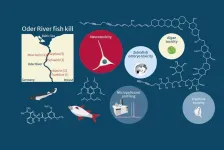(Press-News.org) Montreal, Canada - The "Innovators & Ideas: Research Leader" section of Genomic Psychiatry (ISSN: 2997-2388), published by Genomic Press, New York, features an illuminating Genomic Press Interview with Dr. Gustavo Turecki, a trailblazer in psychiatric research at McGill University. The interview delves into Turecki's pioneering work on depression, suicide prevention, and the molecular underpinnings of mental health, offering valuable insights into cutting-edge research shaping our understanding of these critical issues.
Dr. Turecki, who serves as the Chair of the Department of Psychiatry at McGill University and the Scientific Director of the Douglas Institute, shares his journey from a competitive swimmer interested in sports medicine to a world-renowned psychiatrist and researcher. His work focuses on understanding brain molecular changes in major depressive disorder and suicide, as well as the processes explaining antidepressant treatment response.
"I hope my work will contribute to elucidate processes and mechanisms underlying psychopathology, particularly major depressive disorder and suicide risk," Dr. Turecki explains. "More specifically, I hope my work will help gain some insight into how the brain responds to social and emotional experience and how traumatic experiences trigger pathological depressive states."
The Genomic Press Interview highlights Dr. Turecki's current research focus on understanding molecular changes associated with depression at single-cell resolution. His team has adapted diverse single-cell genomic methods to study postmortem human brain tissue, exploring different aspects of major depression. They are also investigating the role of extracellular vesicles in systemic communication and how their cargo may be manipulated to elicit therapeutic responses.
Dr. Turecki's work represents a significant advancement in the field of psychiatric research. By combining clinical practice with cutting-edge molecular research, he is bridging the gap between laboratory findings and patient care. His studies on the epigenetic effects of early-life adversity on the brain have been particularly groundbreaking, offering new perspectives on the long-term impacts of trauma.
The interview also touches on Dr. Turecki's personal journey, including the pivotal moment during his residency when treating a case of dizygotic twins with shared delusion sparked his interest in the genetic basis of mental illness. This experience set him on the path to becoming a leader in psychiatric genomics.
"Dr. Turecki's work exemplifies the innovative research being conducted at the intersection of genomics and psychiatry," says Dr. Julio Licinio, Editor-in-Chief of Genomic Psychiatry. "His insights into the molecular mechanisms underlying depression and suicide risk are not only advancing our understanding of these conditions but also paving the way for more effective, personalized interventions."
The Genomic Press Interview with Dr. Gustavo Turecki offers a fascinating glimpse into the life and work of a scientist at the forefront of psychiatric research. It underscores the potential of molecular and genomic approaches to revolutionize our understanding and treatment of mental health disorders, particularly depression and suicide risk.
Dr. Turecki emphasizes the importance of a supportive and collegial research environment, despite the competitive nature of the field. His commitment to fostering the next generation of researchers while maintaining a patient-centered focus exemplifies the best of academic medicine.
The full Genomic Press Interview "Gustavo Turecki: Three fundamental questions – How does the brain respond to social and emotional experiences? Why does psychological trauma trigger depressive states? What are the mechanisms of antidepressant responses?" was published on 25 January 2024, and is available online in the Innovators & Ideas: Research Leader section of Genomic Psychiatry: https://gp.genomicpress.com/aop/.
About Genomic Psychiatry – Genomic Psychiatry: Advancing Science from Genes to Society (ISSN: 2997-2388) represents a paradigm shift in genetics journals by interweaving advances in genomics and genetics with progress in all other areas of contemporary psychiatry. Genomic Psychiatry publishes peer-reviewed papers of the highest quality from any area within the continuum that goes from genes and molecules to neuroscience, clinical psychiatry, and public health.
END
Renowned psychiatrist Dr. Gustavo Turecki sheds light on depression, suicide, and brain trauma response
McGill University researcher discusses groundbreaking work on molecular mechanisms of mental health in exclusive Genomic Press Interview
2024-09-06
ELSE PRESS RELEASES FROM THIS DATE:
Plasmonic modulators could enable high-capacity space communication
2024-09-06
Researchers have achieved data rates as high as 424Gbit/s across a 53-km turbulent free-space optical link using plasmonic modulators— devices that uses special light waves called surface plasmon polaritons to control and change optical signals. The new research lays the groundwork for high-speed optical communication links that transmit data over open air or space.
Free-space-optical communication networks could aid space exploration because they can provide high-speed, high-capacity data transmission with lower latency and less interference than traditional radio frequency communication systems. ...
UPenn’s Orphan Disease Center to amplify SYNGAP1 research: SynGAP Research Fund’s Million Dollar Bike Ride team raises $74,851 for one-year grant
2024-09-06
Mill Valley, CA – September 5, 2024 – The SynGAP Research Fund 501(c)(3) is proud to announce its continued collaboration with the University of Pennsylvania’s (UPenn) Orphan Disease Center (ODC) through the Million Dollar Bike Ride (MDBR) Pilot Grant Program. ODC is accepting proposals for a grant award of $74,851 to further advance critical research in SYNGAP1-Related Disorders (SRD). Instructions for submitting a letter of interest are available here. Applications are due in two weeks by September 20, 2024.
Why We Participate in This Project
The SynGAP Research ...
Crystallized alternative DNA structure sheds light on insulin and diabetes
2024-09-06
The first crystal structure of an alternative DNA shape from the insulin gene has been revealed by a UCL-led research team.
DNA is widely accepted to be formed of two strands that wind around one another, known as a double helix, but it is possible for DNA to change shape and structure. The new study, published in Nature Communications, reveals the detail in the structure of a type of DNA called i-motif by crystallising it for the first time.
Co-lead author Dr Zoë Waller (UCL School of Pharmacy) ...
Protecting just 0.7% of world’s land could help save a third of most unique and endangered species
2024-09-06
Conservation efforts directed towards just 0.7% of the world’s land mass could help protect one third of the world’s threatened and unique tetrapod (four-limbed vertebrate) species, new research by Imperial College London, On the Edge, and ZSL has shown.
The study, led by researchers at Imperial College London and published this week in Nature Communications, finds that large gains in conservation are possible by focusing on areas home to exceptional biodiversity and species with high levels of evolutionary distinctiveness and global ...
TGF-beta and RAS signaling are both required for lung cancer metastasis, study finds
2024-09-06
When it comes to cancer metastasis, it takes two to tango. That was one of the key findings of a new study led by researchers at Memorial Sloan Kettering Cancer Center (MSK): The TGF-beta and RAS signaling pathways work together to spur the spread of cancer in lung adenocarcinoma, a leading cause of cancer deaths around the world.
Take away one of those two signals, and lung cancer will not be able to spread (metastasize) to new parts of the body, their findings in animal models suggest.
The research, published September 6 in Cell, points to new opportunities to potentially prevent metastasis, thanks to an updated understanding of the underlying processes.
“About ...
5 lessons to level up conservation successfully
2024-09-06
Conservation needs to scale successfully to protect nature. A new paper takes lessons from around the world to show how that might be done.
To reverse biodiversity loss and meet ambitious global targets, conservation programmes designed to preserve everything from forests to fish need to work ‘at scale’.
Scaling can mean three things. Scaling ‘out’ means expanding a programme to new people and places, while scaling ‘up’ means bringing in higher-level institutions, such as governments introducing policies or incentives that make it easier for individuals and private companies to engage.
Scaling ‘deep’ means changing hearts and minds – ...
Researchers advance new class of quantum critical metal that could advance electronic devices
2024-09-06
A new study led by Rice University’s Qimiao Si has unveiled a new class of quantum critical metal, shedding light on the intricate interactions of electrons within quantum materials. Published in Physical Review Letters on Sept. 6, the research explores the effects of Kondo coupling and chiral spin liquids within specific lattice structures.
“The insights gained from this discovery could lead to the development of electronic devices with extreme sensitivity, driven by the unique properties of quantum-critical ...
DOE, ORNL announce opportunity to define the future of high-performance computing
2024-09-06
The U.S. Department of Energy’s (DOE) Office of Science (SC) today announced a new research and development opportunity led by Oak Ridge National Laboratory (ORNL) to advance technologies and drive new capabilities for future supercomputers. This industry research program worth $23 million, called New Frontiers, will initiate partnerships with multiple companies to accelerate the R&D of critical technologies with renewed emphasis on energy efficiency for the next generation of post-exascale computing in the 2029 ...
Cannabidiol demonstrated to alleviate symptoms of Leigh syndrome
2024-09-06
A study led by the UAB Institut de Neurociències and published in the journal Nature Communications demonstrates in animal models how daily administration of cannabidiol (CBD), a substance obtained from the cannabis plant, extends lifespan and improves symptoms associated with Leigh syndrome. This severe mitochondrial disease affecting children is characterised by a progressive decline in cognitive and motor functions and premature death. The research group also demonstrated in both mice and fibroblasts from children with ...
A chemical cocktail of micropollutants amplified the effect of algal toxins causing mass fish mortality on the River Oder in 2022
2024-09-06
Summer 2022’s environmental disaster led to the death of up to 60 per cent of fish biomass and up to 85 per cent of mussel and snail biomass in the River Oder. In August 2022, the UFZ set up an interdisciplinary ad hoc working group together with researchers from the Leibniz Institute of Freshwater Ecology and Inland Fisheries (IGB), the University of Veterinary Medicine, Vienna (Vetmeduni) and the University of Birmingham. They took water samples at five locations along the Oder, extracted poisoned ...
LAST 30 PRESS RELEASES:
How AI tools like DeepSeek are transforming emotional and mental health care of Chinese youth
Study finds link between sugary drinks and anxiety in young people
Scientists show how to predict world’s deadly scorpion hotspots
ASU researchers to lead AAAS panel on water insecurity in the United States
ASU professor Anne Stone to present at AAAS Conference in Phoenix on ancient origins of modern disease
Proposals for exploring viruses and skin as the next experimental quantum frontiers share US$30,000 science award
ASU researchers showcase scalable tech solutions for older adults living alone with cognitive decline at AAAS 2026
Scientists identify smooth regional trends in fruit fly survival strategies
Antipathy toward snakes? Your parents likely talked you into that at an early age
Sylvester Cancer Tip Sheet for Feb. 2026
Online exposure to medical misinformation concentrated among older adults
Telehealth improves access to genetic services for adult survivors of childhood cancers
Outdated mortality benchmarks risk missing early signs of famine and delay recognizing mass starvation
Newly discovered bacterium converts carbon dioxide into chemicals using electricity
Flipping and reversing mini-proteins could improve disease treatment
Scientists reveal major hidden source of atmospheric nitrogen pollution in fragile lake basin
Biochar emerges as a powerful tool for soil carbon neutrality and climate mitigation
Tiny cell messengers show big promise for safer protein and gene delivery
AMS releases statement regarding the decision to rescind EPA’s 2009 Endangerment Finding
Parents’ alcohol and drug use influences their children’s consumption, research shows
Modular assembly of chiral nitrogen-bridged rings achieved by palladium-catalyzed diastereoselective and enantioselective cascade cyclization reactions
Promoting civic engagement
AMS Science Preview: Hurricane slowdown, school snow days
Deforestation in the Amazon raises the surface temperature by 3 °C during the dry season
Model more accurately maps the impact of frost on corn crops
How did humans develop sharp vision? Lab-grown retinas show likely answer
Sour grapes? Taste, experience of sour foods depends on individual consumer
At AAAS, professor Krystal Tsosie argues the future of science must be Indigenous-led
From the lab to the living room: Decoding Parkinson’s patients movements in the real world
Research advances in porous materials, as highlighted in the 2025 Nobel Prize in Chemistry
[Press-News.org] Renowned psychiatrist Dr. Gustavo Turecki sheds light on depression, suicide, and brain trauma responseMcGill University researcher discusses groundbreaking work on molecular mechanisms of mental health in exclusive Genomic Press Interview










